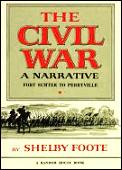
Tuesday, January 24, 2006
I used to read only one book at a time. Not anymore. I usually have one book that I try to read at all times, presently Shelby Foote's Civil War, but I always have others around the house, within reach. Tobias Wolff's Old School, A.B. Guthrie, Jr.'s The Big Sky and Lily Tuck's The News From Paraguay on my desk, next to my laptop, where the shadow from my desk lamp covers a quarter of the books, while casting a larger shadow over the Marc Chagall postcard that I'm no longer using as a bookmark.
On my bedside table, I have Philip Roth's The Plot Against America dominating my tiny black alarm clock, but fighting for space with the steel reading lamp. On the bottom shelf the night stand is Thoreau's Walden and Henry James's The Portrait of a Lady, which I've discarded for the time being. On the opposite side of my bed, on my unfinished wood crate filled with my vinyl, are the other two volumes of Foote's Civil War and Jonathan Safran Foer's Extremely Loud and Incredibly Close, which I'm hesitant to read because I disliked Everything is Illuminated so much. (Even though I wanted to like it so much. But I loved his wife, Nicole Krauss's, novel The History of Love. Possibly one of the best books I read last year.)
I've never read anything by Roth before, so I'll probably start Plot soon enough, but I don't really know which book I'm going to begin next. I just like to keep my options open.
On my bedside table, I have Philip Roth's The Plot Against America dominating my tiny black alarm clock, but fighting for space with the steel reading lamp. On the bottom shelf the night stand is Thoreau's Walden and Henry James's The Portrait of a Lady, which I've discarded for the time being. On the opposite side of my bed, on my unfinished wood crate filled with my vinyl, are the other two volumes of Foote's Civil War and Jonathan Safran Foer's Extremely Loud and Incredibly Close, which I'm hesitant to read because I disliked Everything is Illuminated so much. (Even though I wanted to like it so much. But I loved his wife, Nicole Krauss's, novel The History of Love. Possibly one of the best books I read last year.)
I've never read anything by Roth before, so I'll probably start Plot soon enough, but I don't really know which book I'm going to begin next. I just like to keep my options open.
Thursday, January 19, 2006

Shelby Foote's narrative history of the Civil War is brilliant...thus far. I'm only 250 pages in to the three volume, 3,000 page saga, but it reads like an epic novel. Asked to write a book on the Civil War, the Southern born writer began, but couldn't stop. Over 3,000 pages and decades later, Foote's three volume narrative stands as a testament of American literature and history. Foote's account is unique in it's ability to transcend traditional history writing standards. Like his contemporary David McCullough, these two men are writers who chose American history as their subjects. Though Foote wrote numerous novels that met with some success, it was his Civil War that made him a respected literary figure and historian.
But it wasn't until Foote was featured in Ken Burns's Civil War documentary, in which Foote was the main commentator, that he became a star. His smooth Southern accent, wit and storytelling made him a sensation. The white-bearded Foote's novel found a new audience. And it's the first time I heard of him. I was as much amazed with the engaging Foote as I was with the documentary as a whole. But it wasn't until this week that I started the first volume. If anyone has any qualms about reading books on history, should pick up this volume...or at least the first book. There are no footnotes, no endnotes, just a story that is all too real. We know many of the names, but through Foote, we begin to know the real men. I know it's a cliche, but it's true. Grant, Sherman, McClellan, Davis, Lincoln, Stonewall Jackson...I've only just begun the epic and may not finish all three volumes anytime soon, but I know I'm already a better person for reading this book. Shelby Foote, a great American author and an even greater man.
In memory of Shelby Dade Foote November 17, 1916 - June 27, 2005
Subscribe to:
Posts (Atom)